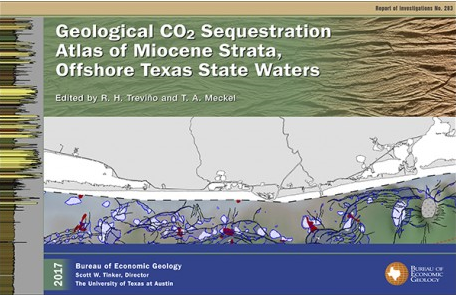SMART
Science-informed Machine Learning for Accelerating Real-Time Decisions in Subsurface Applications (SMART) Initiative
1/1/2020 – 6/30/2025
GCCC Principal Investigator: Seyyed Hosseini

Background
The SMART Initiative is a 10-year, multi-organizational effort funded by the Department of Energy’s Carbon Storage and Upstream Oil & Gas Program to transform how people interact with subsurface data by application of science-based machine learning and data analytics. Read more and find partners on DOE’s webpage.
Objective
The objective of this task is to demonstrate an alpha-version interactive platform for dynamically learning how a CO2 storage reservoir performs/behaves for different operational strategies, with an initial emphasis on placement and operation of both injection wells and extraction wells.
Approach
As a subcontractor, the team at The University of Texas at Austin’s Bureau of Economic Geology will actively participate and contribute to developing Rapid Forecasting Workflows and proof-of-concept demonstrations.
The GCCC will identify various types of reservoirs, reservoir properties and operational parameters that are most relevant. In addition, UT-BEG will provide clean datasets based on real field applications that can be used as a working dataset. Furthermore, UT-BEG will implement relevant deep machine learning tools to the selected synthetic data sets.
Research Team

Dr. Seyyed Hosseini,
Research Professor

Research Professor

Postdoctoral Fellow
Summary of Project Successes
Fan, M., Wang, H., Zhang, J., Hosseini, S. A., and Lu, D., 2024, Advancing spatiotemporal forecasts of CO2 plume migration using deep learning networks with transfer learning and interpretation analysis: International Journal of Greenhouse Gas Control, v. 132, no. 104061, 15 p., http://doi.org/10.1016/j.ijggc.2024.104061.
Wang, H., Guo, R., Dalton, L. E., Crandall, D., Hosseini, S. A., Fan, M., and Chen, C., 2024, Comparative assessment of U-Net-based deep learning models for segmenting microfractures and pore spaces in digital rocks: SPE Journal, v. 29, no. 11, p. 5779–5791, http://doi.org/10.2118/215117-PA.
Wang, H., Hosseini, S. A., Tartakovsky, A. M., Leng, J., and Fan, M., 2024, A deep learning-based workflow for fast prediction of 3D state variables in geological carbon storage: a dimension reduction approach: Journal of Hydrology, v. 636, no. 131219, 18 p., http://doi.org/10.1016/j.jhydrol.2024.131219.
Shokouhi, P., Kumar, V., Prathipati, S., Hosseini, S. A., Giles, C. L., and Kifer, D., 2021, Physics-informed deep learning for prediction of CO2 storage site response: Journal of Contaminant Hydrology, v. 241, no. 103835, 13 p., http://doi.org/10.1016/j.jconhyd.2021.103835.
Thanks to Former Researchers
- Dr. Jianqiao “Tim” Leng, former Postdoctoral Fellow
Last Updated: April 22, 2025



